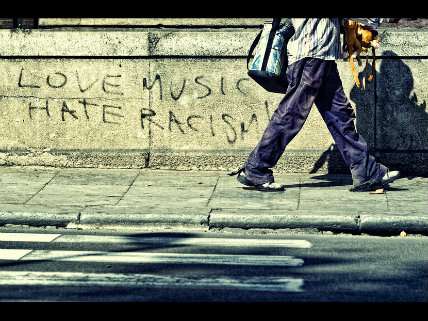'Racism' Today Looks Little Like Racist Ideology of Yore

In the British magazine spiked, sociology professor Frank Furedi looks at how our cultural concept of racism has shifted. Once understood as something ideological and systemic, racism is now frequently used to describe any act or speech that reveals potential prejudice or could cause offense.
Furedi explains that in the lead-up to the recent EU elections, there seemed to be "a new consensus, especially in the media, which says the problem of racism is far greater today than it was in the past." You'd be hard-pressed to find many Americans in agreement about the relative problem of racism today, but Furedi's piece still has applicable insights for those of us west of the eurozone.
Anyone attuned to pop culture, current events and social media knows how frequently charges of racism are thrown about and how fluid the concept has become. "Racism" on Twitter today can merely mean not knowing how to properly signal that one isn't racist (that there's a privilege inherent in knowing how to check one's privilege seems lost on many).
There are certainly omnipresent examples of systemic and individual racism in 21st century America. But the kind of causes and comments that most rally Internet social justice warriors tend to have little relation to these, and the concept of racism they espouse has strayed far from context or historical meaning. From Feredi:
We should recall that until the outbreak of the Second World War, racial thinking was rarely questioned in any part of the world. Even in academic circles, critics of racism were very much in a minority in the 1930s. Back then, the term 'racist' was used neutrally and sometimes even positively in Western societies. It was only in the 1930s that the word 'racism' started to acquire negative connotations. It was in that decade that the use of the word racism in a derogatory way was first recorded in the English language. But even then, the idea of racial equality had few defenders–including within the intellectual community.
Since the 1930s, racism, with its oppressive claim that some people are superior to other, 'subhuman' people, has been systematically discredited. The idealisation of the racial superiority of whites and the dehumanisation of people from Africa and Asia has been culturally marginalised. Even the most extreme xenophobic cults and parties now find it difficult explicitly to use the language of racial ideology. The notion of racial superiority is conspicuous by its absence in public discussion in the twenty-first century.
[…] Historically, racism expressed the worldview of the powerful. A sense of superiority, be it biological, moral or cultural, was integral to the outlook of the elites that dominated Western societies. Today, those with economic, political and cultural power rarely express themselves through the narrative of race. The powerful rarely express open hostility or crude prejudice towards other groups of people. On the contrary, today it tends to be those who feel they have been left behind, who believe they have been socially and culturally marginalised by mainstream society, who express some kind of racist thinking.
Racism, for the record, is defined as a "doctrine that inherent differences among the various human races determine cultural or individual achievement; a policy, system of government, etc., based on fostering such a doctrine; or hatred or intolerance of other races." It's an entire belief system, a pattern of conscious thoughts and actions. It's not an offhandedly offensive remark or insufficient sensitivity to how your views may be culturally or racially biased.
But the redefining of racism has been long-coming, according to Feredi:
Since the early 1980s, racism has been subtly redefined as a psychological problem. The redefinition of racism from an act of conscious oppression to an unwitting problem of the mind was boosted by the former British High Court judge, Sir William Macpherson, in his 1999 report into the Metropolitan Police's handling of the murder of a black London teenager, Stephen Lawrence. The Macpherson report defined institutional racism as something that 'can be seen or detected in processes, attitudes and behaviour which amount to discrimination through unwitting prejudice, ignorance, thoughtlessness and racial stereotyping which disadvantage minority ethnic people'. The key word here is 'unwitting'–this depicts racism as an unconscious response driven by unspecific emotions. The idea that people can be racists unwittingly means that literally anyone can be a racist–whether they know it or not.
… The complexity of the psychological motivation behind so-called unwitting racism was discussed by Macpherson in the following terms: 'A racist incident is any incident which is perceived to be racist by the victim or any other person.' In making individual subjective experience the foundation stone of accusations of racism, Macpherson ensured that 'unwitting racism' would be a problem that would expand exponentially as time went by.
Read the whole thing here.


Show Comments (107)